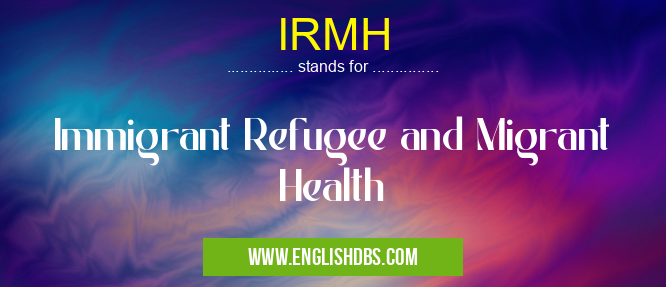What does IRMH mean in HEALTHCARE
IRMH stands for Immigrant Refugee and Migrant Health. It is an important subject in the medical field that seeks to focus on the health of immigrants, refugees and migrants. It focuses on health promotion, disease prevention and appropriate care for those who move into a new country or region. This includes assessing risks associated with entering a new environment and understanding how language, cultural knowledge and access to economic resources affect healthcare needs of migrants, refugees or immigrants.

IRMH meaning in Healthcare in Medical
IRMH mostly used in an acronym Healthcare in Category Medical that means Immigrant Refugee and Migrant Health
Shorthand: IRMH,
Full Form: Immigrant Refugee and Migrant Health
For more information of "Immigrant Refugee and Migrant Health", see the section below.
» Medical » Healthcare
Meaning
Immigrant Refugee and Migrant Health is the field of medicine dedicated to protecting the physical well-being of those who have moved from one place to another, whether across countries or regions. It covers various aspects of healthcare such as assessing risk factors associated with resettlement into a new environment, providing resources to address health concerns arising due to limited language understanding or cultural knowledge, evaluating the impact of social determinants on health outcomes and providing appropriate care within the healthcare system while recognizing diversity.
Impact
Immigrants, refugees and migrants are often at risk for certain medical conditions due to their unique experience in resettling into an unfamiliar place. Their access to healthcare may be limited due to financial insecurity, cultural barriers or language difficulties so it is essential that they have access to services that are tailored specifically for their needs. IRMH aims at reducing disparities between migrant populations and native populations by providing better health services, counseling services and advocacy initiatives that help mitigate interventions for migrants, refugees or immigrants who need assistance navigating complex healthcare systems in new countries.
Essential Questions and Answers on Immigrant Refugee and Migrant Health in "MEDICAL»HEALTHCARE"
What is Immigrant Refugee and Migrant Health?
Immigrant Refugee and Migrant Health (IRMH) is a specialty field of healthcare that provides healthcare services to immigrants, refugees and migrants. This includes preventive care, diagnosis, treatment and management of health conditions that may be related to their journey to a new home.
Who is eligible for IRMH services?
IRMH services are available to anyone who has immigrated, sought refuge or migrated to another country. This can include individuals with legal or illegal immigration status.
What types of healthcare services are provided by IRMH providers?
Services provided by IRMH providers can include physical examinations, mental health screenings, vaccinations, access to medication, primary care management, support services such as language interpretation or cultural sensitivity training and referral services.
Why is it important for immigrants and refugees to have access to proper healthcare?
Immigrants and refugees face unique challenges in accessing quality medical care due to financial barriers, language barriers or limited understanding of the U.S. healthcare system. It is important for them to receive proper care in order for them to better integrate into their new home and remain healthy.
How long does an immigrant/refugee have access to IRMH services?
Access to IRMH services will depend on the individual's circumstances but typically they are available until the individual has fully settled in the new location and can access resources independently. In some cases, access may be offered permanently depending on the individual's situation.
Are there any costs associated with using IRMH services?
The cost of using IRMH services varies based on the individual's insurance coverage as well as any fees associated with receiving medical attention from a particular provider or facility. It is best for individuals seeking these services to contact their local healthcare provider directly for inquiries about costs.
How do I find an immigrant/refugee friendly healthcare provider?
In order to locate a healthcare provider that specializes in serving immigrant and refugee populations it is recommended that you utilize online resources as well as contacting your local community health center or refugee resettlement office if available in your area. These organizations will often be more familiar with local medical practitioners who offer culturally-sensitive care tailored towards these communities' needs.
: What should I bring when visiting an immigrant/refugee friendly healthcare provider?
: If you plan on visiting an immigrant/refugee friendly health care provider it’s important that you bring all documents required by your state including proof of residency, identity card or passport if applicable; proof of income; proof of insurance coverage; past medical records; a list of current medications (if applicable); immunization records; copy of original birth certificate; any court documents related to immigration status (if applicable); proof of relationship between members family members accompanying the patient (if applicable); language preference indicator form (if applicable) etc..
: What should I do if I can’t find an appropriate doctor near me who offers IRHM Services?
: Contacting a local community health center may be beneficial since most community health centers employ multilingual staff members who will be able question patients relevant questions about their symptoms accurately without imposing any language barriers during visit therefore ensuring appropriate diagnosis and treatment plans are suggested . There are also free 1-800 helplines providing translation ,interpretation referral info which would provide additional assistance locating appropriate providers if necessary.
Final Words:
IRMH is an important field in medicine that strives to protect the physical wellbeing of those who move from one place to another. It evaluates different components such as language capability, cultural knowledge and socioeconomic status in order to provide tailored services that address any health weaknesses among population groups migrating across borders which can lead to improved overall health outcomes. Through this approach we hope that vulnerable populations are able to gain access to quality care despite their circumstances.
